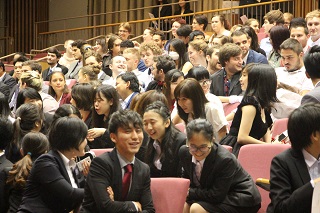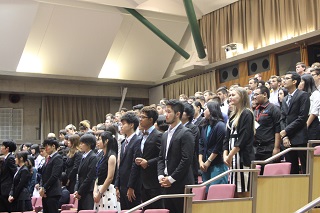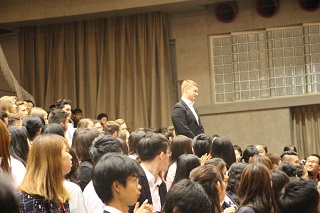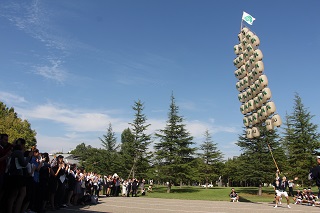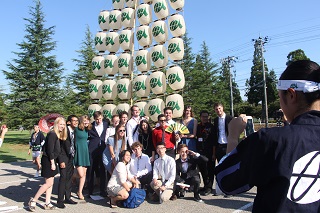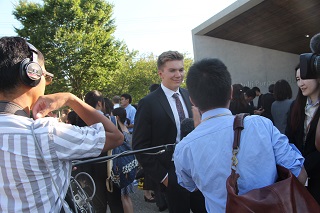Information
AIU Welcomes Fall 2016 New Students at Matriculation Ceremony
AIU held its 2016 Fall Matriculation Ceremony on September 1. Mr. Hidefumi Nakashima, Vice-Governor of Akita Prefecture, and many other honorable guests were present to welcome 200 newcomers, including 167 short-term international students from 29 countries and regions, to the AIU Community.For the breakdown of international students by country, Please see below.
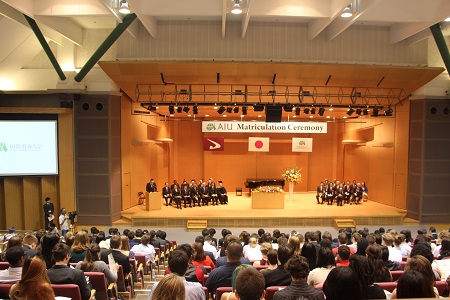
President’s Commencement Address
Norihiko SUZUKI, DBA
To the students matriculating to Akita International University, I offer my congratulations. I am Norihiko Suzuki, the President of AIU.
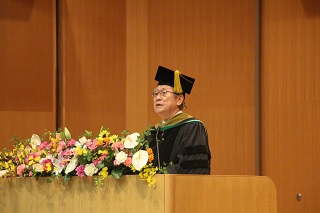
AIU is now welcoming 200 new students in total, which include 24 undergraduate students, 167 international students and 9 graduate students. From its establishment in 2004, AIU began with a new and timely academic philosophy called “international liberal arts.” Through this distinctly holistic and global approach, AIU has worked to help students acquire superior communication skills in English and other languages and provide them with a rich and meaningful education. With a strong commitment to nurture students with practical expertise and specialized knowledge born out of a global perspective, it is our mission to foster individuals who will contribute significantly to the international and local community. We seek students who share our philosophy as follows:
- Those with a strong desire to learn and a keen awareness of global issues
- Those with a practical command over other languages, especially English, who can play their part on the international stage, who aspire to gain a well-rounded education
- And those with an inquisitive mind and a keen interest in various cultures, languages, histories, and societies of the world, as well as in topics related to international relations such as the economy and the environment
Everyone who is here today has the potential to become such students after passing our challenging examination. We sincerely welcome you as a member of our AIU community.
Well, it could be said that the university education in Japan has reached a significant crossroad. Since approximately 150 years ago, a university education has been characterized with specialized and narrow areas that are ever-evolving, and can even become obsolete. Thus, knowledge obtained at university would not be able to keep up with the times. This is not what a university education should represent. Knowledge and ability gained through a university education should be effective at a universal level beyond the trend or change of times. So, just what is the content and direction of such education? The answer would be the one we aim to offer at AIU, known as “International Liberal Arts,” which places great significance on the global society.
Our university has an English name, Akita International University, as well as a Japanese name, Kokusai Kyouyou Daigaku. The vision of this university can be seen through a juxtaposition of the two names. The question is: what are the key features of an “international liberal arts” education? In order to answer this, we have to consider the terms ‘international’ and ‘liberal arts’ separately. The notion of ‘liberal arts’ originated from the Latin term, ‘artes liberales.’ The English word ‘art’ originated from ‘artes,’ which indicates physical movement/activities, such as techniques, ingenuity and the sciences. Likewise, the English word ‘liberal’, or ‘liberate’, derives from ‘liberales’, which means ‘to free, release or emancipate’. Therefore, the Latin concept ‘artes liberales’ implies “skills/arts for liberated individuals” or “skills/arts to liberate individuals.” The next question then is, “from what do human beings want to be liberated from?” The definition is surely a ‘liberation from the values, conventional wisdom, prejudice and relationships to which we are bound.’ This also means that, having once liberated oneself, the individual needs to rebuild his or her identity. In this sense, to liberate the self is to create a new identity. This is the basic principle of a liberal arts education.
As one of our attempts to achieve this mission further, AIU applied for the MEXT’s Top Global University Project, also known as the “Super Global University Project,” in September of 2014. Successfully, AIU was selected as one of the grant recipients out of 109 universities. Thus, our “Japan’s world-class liberal arts university” project is being implemented, which is mainly divided into 4 long-term projects.
The first project is to promote a 24-hour liberal arts education by enhancing dormitory life on campus. Almost 90% of AIU students live on campus. By organizing some of the dormitories around academic, cultural and career-oriented themes, we aim to expand opportunities for students to learn with and from one another. The second project involves aligning the AIU curriculum with top-tier university curricula overseas so that when AIU students study abroad, they are fully prepared for the academic rigors they will encounter. Equally important, through curricular alignment, international students coming to AIU for one year or one semester can receive full credit at their home institutions. Our goal in this project is to implement a world standard curriculum. The third project involves a desire to reform for the betterment of English language education in Japan by two main activities. The first activity is the “English Village,” which brings junior and senior high school students to AIU, where they can learn with and from AIU students who are capable of teaching English in English. The second activity of this project involves AIU faculty providing “Teachers’ Seminars” for English teachers of secondary schools. And the fourth Super Global University project is an international benchmarking scheme that will allow AIU to measure its educational progress against the progress of similar liberal arts institutions in the West.
Nevertheless, it does not mean that we, all faculty and staff members, are going to merely stand by and watch while you tackle your struggles. AIU offers an environment worthy of your efforts with ardent faculty members to help advance your intellectual growth, along with supportive staff members, an unprecedented curriculum that offer all courses in English, a compulsory one-year study abroad experience, a library that is open 24 hours a day and 365 days a year, small classes for increased dialogue, and compulsory dormitory living for all freshmen to promote intercultural experiences. Through various training and experiences, you will develop and mature yourself, but as I said before, it is all up to you on how much you will benefit from your experiences. Now, take a vow within your heart to develop and challenge yourself during these four years.
Let’s take the first step now.
New Short-term International Students, By Country
| Country, Region | Number of new students |
| Morocco | 1 |
| Brunei | 3 |
| China | 1 |
| Hong Kong | 2 |
| Korea | 1 |
| Macau | 1 |
| Malaysia | 2 |
| Singapore | 2 |
| Taiwan | 16 |
| Thailand | 5 |
| Vietnam | 3 |
| Belgium | 1 |
| Cyprus | 1 |
| Czech Republic | 3 |
| Denmark | 3 |
| France | 17 |
| Germany | 4 |
| Lithuania | 2 |
| Netherlands | 7 |
| Norway | 3 |
| Russia | 3 |
| Sweden | 1 |
| Switzerland | 1 |
| UK | 8 |
| Canada | 9 |
| USA | 59 |
| Australia | 6 |
| New Zealand | 1 |
| Chile | 1 |
| Total | 167 |
